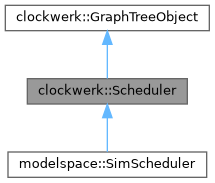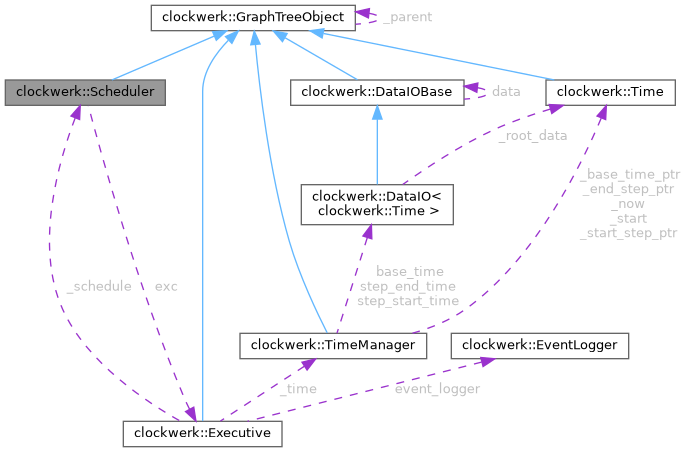 |
ModelSpace
|
 |
ModelSpace
|
Base class implementation of the scheduler. More...
#include <Scheduler.h>


Public Member Functions | |
| Scheduler (Executive &executive) | |
| Constructor for the scheduler. | |
| void | create () |
| Function to set up our scheduler. | |
| virtual int | startup () |
| Function to start and configure the scheduler. | |
| virtual int | step (const clockwerk::Time &step_size=clockwerk::Time(0, 999999999+1)) |
| Function to step the scheduler by a single step. | |
| virtual int | run () |
| Function to run the scheduler until pre-determined end conditions identified/calculated by the scheduler. | |
| virtual int | registerTask (Task *task) |
| Function to register tasks with the scheduler. Depending on the scheduler implementation these may be unused. | |
| virtual void | terminate () |
| Function to set the scheduler for termination. | |
| virtual bool | isTerminated () |
| Function to indicate whether the scheduler is terminated. | |
| GraphTreeObject * | parent () |
| Functions to get object's parent/children. | |
| int | parent (GraphTreeObject *new_parent) |
| Function to assign the node's parent via pointer. | |
| int | parent (GraphTreeObject &new_parent) |
| Function to assign the node's parent via reference. | |
| std::vector< GraphTreeObject * > & | children () |
| unsigned int | nChildren () |
| Getters for number of children and descendants. | |
| unsigned int | nDescendants () |
| std::string | name () const |
| Getter and setter for object name. | |
| int | name (const std::string &new_name) |
| int | rank () |
| Getter for the object rank. | |
| virtual int | type () |
| Function to indicate type – -1 by default unless implemented downstream. | |
| bool | loggable () |
| Getter for object logability flag – note no setter because should only be set by this or a derived class in its definition. | |
| std::string | address () |
| Getter for object's string address. | |
| std::vector< std::string > | search (const std::string &address) |
| Function to search through the graph tree by string address. | |
| GraphTreeObject * | getByAddress (const std::string &address) |
| Function to get an object from the graph tree by string address. | |
| void | dump (bool recursive=false) |
| Function to dump the graph node, optionally including descendents. | |
| void | graphNodeInfo () |
| Function to return all info associated with a given graph node. | |
| void | recurseGraphNodeInfo (unsigned int counter) |
| Function to recurse through graph tree and print all node info. | |
| virtual int | header (void *logger) |
| Function to pass headers for this object to the logger. | |
| virtual std::vector< std::string > | header_info () const |
| void | findLoggable (std::vector< GraphTreeObject * > &matches) |
| Function to find all loggable parameters in this node and its children. | |
| virtual int | log (void *logger) |
| Function to log data to a logger. | |
| void | lock (bool recursive=true) |
| Function to lock the graph tree object and its children to changes. | |
| void | unlock (bool recursive=true) |
| Function to unlock the graph tree and its children for changes. | |
| bool | locked () |
| Function to return whether graph tree object is locked. | |
Public Attributes | |
| Executive * | exc |
| Event logger for debugging and key events. | |
Protected Member Functions | |
| void | recalculateDescendants () |
| Function to recursively re-calculate the number of descendants of a given node on the tree. | |
| void | recalculateRank () |
| Function to recursively re-calculate the rank of a given node on the tree. | |
| std::vector< std::string > | decomposeAddress (std::string address) |
| Function to decompose a string into a series of substrings via indexing. | |
| void | findMatches (const std::vector< std::string > &subaddresses, const unsigned int &num_subaddresses, unsigned int index, bool match_found, std::vector< GraphTreeObject * > &matches) |
| Function to find all addresses mathcing the set of substrings @parem subaddresses A vector of subaddresses to match. | |
| std::vector< GraphTreeObject * > | searchNodes (const std::string &address) |
| Function to search through the graph tree by string address. | |
| int | addChild (GraphTreeObject *child) |
| Function to add a child to the graph tree object. | |
| int | removeChild (GraphTreeObject *child) |
| Function to remove a child from the graph node's children. | |
Protected Attributes | |
| log_level_e | _local_log_level = NONE |
| GraphTreeObject * | _parent = nullptr |
| Pointer to the object's parent – should be null if the object is the root. Is set to null by default. | |
| std::vector< GraphTreeObject * > | _children |
| Pointers to the object's children – automatically set to an empty vector, and can be increased to any size. | |
| std::string | _name = DEFAULT_NAME |
| String name for object. | |
| uint16_t | _num_descendants = 0 |
| Total number of descendants (includes children of children) of the tree, again not including the tree itself. | |
| uint8_t | _num_children = 0 |
| Number of direct children of the tree (not including the tree itself) | |
| uint8_t | _rank = 0 |
| Rank for how far down on the graph tree the object is – starts at zero and maxes out at 256 via variable size. | |
| uint8_t | _graph_tree_type = BASE_GRAPH_TREE |
| Variable to store graph tree object type. | |
| bool | _locked = false |
| Variable to lock the graph tree object and prevent structural updates. | |
| bool | _loggable = false |
| Variable to indicate whether the selected object is loggable. Set to false by default. | |
Base class implementation of the scheduler.
This class is a base implementation of scheduler. It is an empty base class and cannot be used without implementation in a derived child class.
The scheduler is the engine that runs simulations and software. It defines the sequence and method of execution for models, tasks, monitors, and events and is tasked with their actual execution. It also manages faults and errors arising from them.
|
inline |
Constructor for the scheduler.
|
protectedinherited |
Function to add a child to the graph tree object.
| child | A pointer to the graph tree object to add to the tree |
|
inherited |
Getter for object's string address.
|
protectedinherited |
Function to decompose a string into a series of substrings via indexing.
| address | The address to be decomposed |
Function to dump the graph node, optionally including descendents.
| recursive | Parameter indicating whether to dump only one node (default/false) or the entire tree (true) |
|
inherited |
Function to find all loggable parameters in this node and its children.
| matches | Expandable vector to hold all matches in the tree |
|
protectedinherited |
Function to find all addresses mathcing the set of substrings @parem subaddresses A vector of subaddresses to match.
| num_subaddresses | The number of subaddresses to match |
| index | The index of subaddresses to search in |
| match_found | Variable indicating whether a match was found higher in the tree |
| matches | Implicit return of all matches to the specified address |
|
inherited |
Function to get an object from the graph tree by string address.
| address | The exact string address to access the variable with |
Function to pass headers for this object to the logger.
| logger | Pointer to logger |
Reimplemented in clockwerk::DataIO< T >, clockwerk::DataIO< bool >, clockwerk::DataIO< clockwerk::Body< double > * >, clockwerk::DataIO< clockwerk::Body< T > * >, clockwerk::DataIO< clockwerk::CartesianVector< double, 2 > >, clockwerk::DataIO< clockwerk::CartesianVector< double, 3 > >, clockwerk::DataIO< clockwerk::CartesianVector< T, 3 > >, clockwerk::DataIO< clockwerk::Euler321< double > >, clockwerk::DataIO< clockwerk::Frame< double > * >, clockwerk::DataIO< clockwerk::Frame< T > * >, clockwerk::DataIO< clockwerk::Matrix< double, 2, 2 > >, clockwerk::DataIO< clockwerk::Matrix< double, 3, 3 > >, clockwerk::DataIO< clockwerk::Matrix< double, 6, 3 > >, clockwerk::DataIO< clockwerk::Matrix< double, 6, 6 > >, clockwerk::DataIO< clockwerk::Matrix< T, 3, 3 > >, clockwerk::DataIO< clockwerk::Node< double > * >, clockwerk::DataIO< clockwerk::Quaternion< double > >, clockwerk::DataIO< clockwerk::Quaternion< T > >, clockwerk::DataIO< clockwerk::Time >, clockwerk::DataIO< double >, clockwerk::DataIO< int >, clockwerk::DataIO< modelspace::integrator_type_e >, clockwerk::DataIO< std::string >, and clockwerk::DataIO< void * >.
|
inlinevirtualinherited |
Reimplemented in clockwerk::Time.
Function to indicate whether the scheduler is terminated.
Reimplemented in modelspace::SimScheduler.
Function to lock the graph tree object and its children to changes.
| recursive | Flag to indicate whether lock should be recursive |
Function to log data to a logger.
| logger | Pointer to logger |
Reimplemented in clockwerk::Time, clockwerk::DataIO< T >, clockwerk::DataIO< bool >, clockwerk::DataIO< clockwerk::Body< double > * >, clockwerk::DataIO< clockwerk::Body< T > * >, clockwerk::DataIO< clockwerk::CartesianVector< double, 2 > >, clockwerk::DataIO< clockwerk::CartesianVector< double, 3 > >, clockwerk::DataIO< clockwerk::CartesianVector< T, 3 > >, clockwerk::DataIO< clockwerk::Euler321< double > >, clockwerk::DataIO< clockwerk::Frame< double > * >, clockwerk::DataIO< clockwerk::Frame< T > * >, clockwerk::DataIO< clockwerk::Matrix< double, 2, 2 > >, clockwerk::DataIO< clockwerk::Matrix< double, 3, 3 > >, clockwerk::DataIO< clockwerk::Matrix< double, 6, 3 > >, clockwerk::DataIO< clockwerk::Matrix< double, 6, 6 > >, clockwerk::DataIO< clockwerk::Matrix< T, 3, 3 > >, clockwerk::DataIO< clockwerk::Node< double > * >, clockwerk::DataIO< clockwerk::Quaternion< double > >, clockwerk::DataIO< clockwerk::Quaternion< T > >, clockwerk::DataIO< clockwerk::Time >, clockwerk::DataIO< double >, clockwerk::DataIO< int >, clockwerk::DataIO< modelspace::integrator_type_e >, clockwerk::DataIO< std::string >, and clockwerk::DataIO< void * >.
|
inherited |
Function to assign the node's parent via reference.
| new_parent | The new parent to assign the node to |
|
inherited |
Function to assign the node's parent via pointer.
| new_parent | The new parent to assign the node to |
Function to recurse through graph tree and print all node info.
Function to register tasks with the scheduler. Depending on the scheduler implementation these may be unused.
| task | The task to register |
| schedule_slot | The slot to register the task to |
Reimplemented in modelspace::SimScheduler.
|
protectedinherited |
Function to remove a child from the graph node's children.
| child | The child to remove |
Function to run the scheduler until pre-determined end conditions identified/calculated by the scheduler.
Reimplemented in modelspace::SimScheduler.
|
inherited |
Function to search through the graph tree by string address.
| address | `The address or address chunk to search for |
|
protectedinherited |
Function to search through the graph tree by string address.
| address | `The address or address chunk to search for |
Function to start and configure the scheduler.
Reimplemented in modelspace::SimScheduler.
|
inlinevirtual |
Function to step the scheduler by a single step.
Reimplemented in modelspace::SimScheduler.
Function to set the scheduler for termination.
Reimplemented in modelspace::SimScheduler.
Function to indicate type – -1 by default unless implemented downstream.
Function to unlock the graph tree and its children for changes.
| recursive | Flag to indicate whether unlock should be recursive |